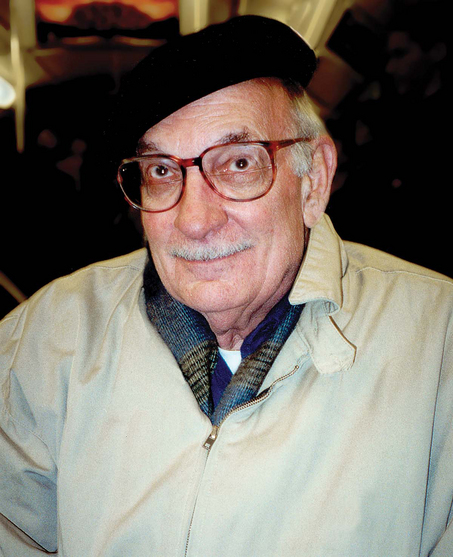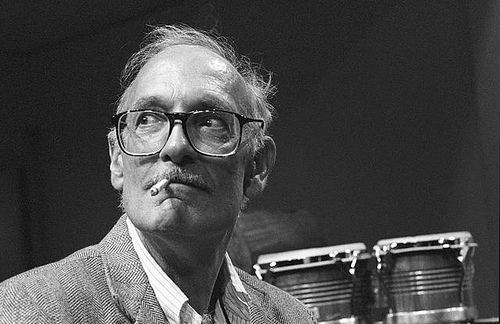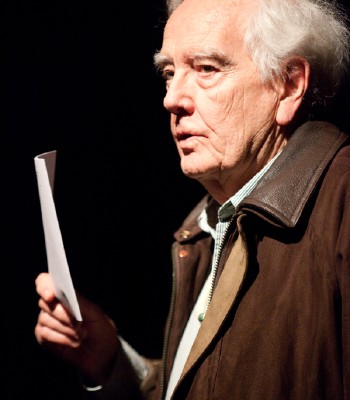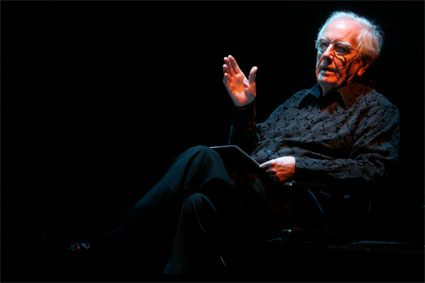<Back to Index>
- Composer George Crumb, 1929
- Composer Robert Ashley, 1930
PAGE SPONSOR


George Crumb (October 24, 1929 - February 6, 2022) was an American composer of contemporary classical music. He is noted as an explorer of unusual timbres, alternative forms of notation, and extended instrumental and vocal techniques. Examples include seagull effect for the cello (ex. Vox Balaenae), metallic vibrato for the piano (ex. Five Pieces for Piano), and using a mallet to play the strings of a contrabass (ex. Madrigals, Book I), among numerous others. He was not an electronic music composer, however many works call for amplification of instruments, such as Black Angels (string quartet) or Ancient Voices of Children (mixed ensemble). Crumb's music contains an intense humanism, which is reflected in his personal definition of music: "a system of proportions in the service of spiritual impulse."
Crumb was born in Charleston, West Virginia, and began to compose at an early age. He studied music first at the Mason College of Music in Charleston where he received his Bachelor's degree in 1950. He obtained his Master's degree at the University of Illinois at Urbana - Champaign, and then briefly studied in Berlin before returning to the United States to study at the University of Michigan, from which he received his D.M.A. in 1959.
Although his scores and recordings sell steadily, Crumb earned his living primarily from teaching. His first teaching job was at a college in Virginia, before he became professor of piano and composition at the University of Colorado in 1958. In 1965 he began a long association with the University of Pennsylvania, becoming Annenberg Professor of the Humanities in 1983. Some of his most prominent students include Margaret Brouwer, Uri Caine, Christopher Rouse, Osvaldo Golijov, Jennifer Higdon, Cynthia Cozette Lee, Yen Lu, James Primosch, Ricardo Zohn - Muldoon, Ofer Ben-Amots and Gerald Levinson.
Crumb retired from teaching in 1997, though in early 2002 was appointed with David Burge to a joint residency at Arizona State University.
Crumb has been the recipient of a number of awards, including the Pulitzer Prize for Music in 1968 for his orchestral work Echoes of Time and the River and a Grammy Award for Best Contemporary Composition in 2001 for his work Star-Child .
Crumb's son, David Crumb, is a successful composer and, since 1997, professor at the University of Oregon. George Crumb's daughter, Ann Crumb, is a successful actress and singer. She recorded his Three Early Songs for the CD George Crumb 70th Birthday Album (1999), and has also performed his Unto the Hills (2001).
After initially being influenced by Anton Webern, Crumb became interested in exploring unusual timbres. He often asked for instruments to be played in unusual ways and several of his pieces are written for electrically amplified instruments.
Crumb's compositions often incorporate theater as an element of performance. In several pieces he asked players to leave and enter the stage during the piece. He has also used unusual layouts of musical notation in a number of his scores. In several pieces, the music is symbolically laid out in a circular or spiral fashion.
Several of Crumb's works, including the four books of madrigals he wrote in the late 1960s and Ancient Voices of Children, a song cycle of 1970 for two singers and small instrumental ensemble (which includes a toy piano), are settings of texts by Federico García Lorca. Many of his vocal works were written for the virtuoso mezzo - soprano singer Jan DeGaetani.
Black Angels (1970) is another piece which displays Crumb's interest in exploring a wide range of timbres. The piece is written for electric string quartet (Crumb notes that amplified acoustic instruments are acceptable, but electric instruments are preferred), and its players are required to play various percussion instruments and to bow small goblets as well as to play their instruments in both conventional and unconventional ways. It is one of Crumb's best known pieces, and has been recorded by the Kronos Quartet.
Another of Crumb's best known works are the four books of Makrokosmos. The first two books (1972, 1973), for solo piano, make extensive use of string piano techniques; the third, known as Music for a Summer Evening (1974), is for two pianos and percussion; the fourth, Celestial Mechanics (1979), was written for piano four-hands. The title Makrokosmos alludes to Mikrokosmos, the six books of piano pieces by Béla Bartók; like Bartók's work, Makrokosmos is a series of short character pieces. Apart from Bartók, Claude Debussy is another composer Crumb acknowledged as an influence here; Debussy's Preludes comprise 2 books of 12 character pieces, whose titles appear at the end. Crumb's first two books of Makrokosmos for solo piano contain 12 pieces, each bearing a dedication (a friend's initials, however he also wittily dedicated a piece to himself) at the end. On several occasions the pianist is required to sing, shout, whistle, whisper, and moan, as well as play the instrument conventionally and unconventionally. Makrokosmos was premiered by David Burge, who later recorded the work.


Robert Ashley (March 28, 1930 - March 3, 2014), was a contemporary American composer, best known for his operas and other theatrical works, many of which incorporate electronics and extended techniques. Along with Gordon Mumma, Ashley was also a major pioneer of audio synthesis.
Ashley was born in Ann Arbor, Michigan. He studied at the University of Michigan with Ross Lee Finney, at the Manhattan School of Music, and was later a musician in the US Army. After moving back to Michigan, Ashley worked at the University of Michigan's Speech Research Laboratories. Although he was not officially a student in the acoustic research program there, he was offered the chance to obtain a doctorate, but turned it down to pursue his music. From 1961 to 1969, he organized the ONCE Festival in Ann Arbor with Roger Reynolds, Gordon Mumma, and other local composers and artists. He was a co-founder of the ONCE Group, as well as a member of the Sonic Arts Union, which also included David Behrman, Alvin Lucier and Gordon Mumma. In 1969 he became director of the San Francisco Tape Music Center. In the 1970s he directed the Mills College Center for Contemporary Music. His notable students include Maggi Payne.
The majority of Ashley's recordings have been released by Lovely Music, which was founded by Performing Artservices, the not - for - profit management organization which represents Ashley and other artists. Ashley's opera Perfect Lives was featured in Peter Greenaway's documentary 4 American Composers. In 2011 two new books of Ashley's by Burning Books were realeased, a re-staging of his 1967 opera That Morning Thing commissioned by Performa '11, and a number of other performances in New York City as part of a week long festival at Incubator Arts.
The Space Theater was a loft specially designed and outfitted for performances with projected images and music. It served as the venue for semiweekly multimedia performances from 1957 to 1964; its creators asked Gordon Mumma and Ashley to produce live electronic music for the productions. The performances included music produced by things such as the "rubbing together of stones" and steel rings thrown along wires.
During their cooperation in Space Theater, Ashley created the Cooperative Studio for Electronic Music in 1958 with Mumma, whom he had originally met in his graduate composition seminars. The studio consisted of little more than spare rooms in each of their houses, where they kept their equipment. Ashley and Mumma were "serious tinkers in electronics," working before synthesizers and electronic musical instruments were commercially available. They invented and built much of their own equipment with materials from Radio Shack. They were two of the earliest composers to work in live generation of music with amplified small sounds.
The success of Space Theater led to the creation of the ONCE festival, a contemporary performing arts event that served as a forum for experimental art and music. Ashley was the director. Other musician participants included Roger Reynolds, George Cacioppo, Bruce Wise and Donald Scarvada. Other collaborating artists were Harold Borkin and Joseph Wehrer, architects; George Manupelli, filmmaker; and Mary Ashley and Milton Cohen, painter - sculptors. There were six ONCE festivals between 1961 and 1965. They were considered "far-out" and controversial, and experienced both support and antagonism from the surrounding community in Ann Arbor. The festivals invited European and jazz composers to participate, and were a major influence on contemporary music of the time.
The operas of Perfect Lives, Atalanta, and Now Eleanor's Idea comprise a trilogy that maintains a pulse of 72 beats per minute throughout (except for the opera Foreign Experiences within the Now Eleanor's Idea tetralogy, which is set to a quarter note = 90). The third episode of Perfect Lives ("The Bank") contains the focal event of this trilogy. The event itself is hard to describe; after a variety of strange events transpire at the bank, i.e. a fight between dogs that speak Spanish and a bucket of water strategically thrown on the bank manager, it is realized that the bank "has no money in the bank," a consequence of the art / crime action taken by the elopers Gwyn and Ed. In describing these curious events, Ashley introduces all of the bank tellers ("Introducing Susie. Susie works at the bank. That's her job. Mostly she helps people count their money. She likes it."), who each have visions, each representing one of the trilogy's operas.
Kate sees the security camera footage from the bank, which contains elements of Episodes 2 through 4 of Perfect Lives. She is, in effect, watching herself. Linda, Susie, and Jennifer see visions of the three suitors of Atalanta, Willard Reynolds, Bud Powell, and Max Ernst, who have accidentally appeared in a spaceship at the moment of the bank incident. Eleanor's vision is conceptually of the four operas that bear her name, although Linda's vision introduces its four characters (Linda, Eleanor, Don, and Junior Jr.) as a foursome. The first section of the opera "Now Eleanor's Idea", entitled Improvement, features a retelling of these events.
Now Eleanor's Idea is an opera tetralogy, part of the larger trilogy described above, based on the idea of heading westward in America, eventually arriving at the Pacific Ocean. Each opera is centered around one of the characters briefly introduced in Episode 3 of Perfect Lives: Eleanor and Linda, tellers at the bank; Don, Linda's husband; and Junior, Jr., their child. These works are subtle in their narrative links to one another. The flow from Perfect Lives leads to Now Eleanor's Idea (the opera, not the tetralogy), focusing on Eleanor and her journey from Midwestern - small - town bank teller to television news reporter to prophet for the Southwestern Hispanic low rider car culture. Don's story is chronicled in Foreign Experiences. Don has moved to California with his family and becomes a professor. Unsatisfied with his existence, Don embarks on a mystical quest. Improvement (Don Leaves Linda) focuses on Linda — here a metaphor for the Jews forced out of Spain in 1492 — who is abandoned by her husband Don at a highway rest stop. Linda meets many characters in her travels, including a tap dancer who is a stand-in for Giordano Bruno, and settles into a cosmopolitan existence with her son, Junior Jr. In a dream that echoes the uncertain journey of his father, Junior, Jr.'s opera, el / Aficionado, is a post - mortem on a mysteriously botched exercise in espionage. Ashley says that each of these scenarios is in reality the simultaneous dream of the protagonist, happening at the focal moment of Perfect Lives.
Ashley, along with Sam Ashley, Thomas Buckner, Jacqueline Humbert, and Joan LaBarbara, performed the complete tetralogy in 1994 in Avignon and at the Brooklyn Academy of Music. Recordings of the operas have been released gradually, first with Improvement in 1992, followed by el / Aficionado in 1994, Foreign Experiences in 2006, and Now Eleanor's Idea in 2007.
Ashley has ascribed various meanings to the individual elements of the trilogy. One layer of meaning is the journey, presumably of European - Americans, westward across America. Atalanta represents those in the new world who are acutely aware of their tradition in the old world. This is represented in the lengthy stories on great figures of the past (the "Anecdotes", etc.). Perfect Lives represents life in the Midwest, which Ashley was interested in "because it was flat". The stories have gotten shorter and are now just quaint colloquialisms and idioms (think of the string of phrases punctuated by "AND" in Episode 4). Now Eleanor's Idea is about the journey beyond the familiar to the West Coast, presumably the end of the world, i.e. a certain civilization was established when European adventurers found themselves in California and figured they would likely never make it home. Rather than anecdotes and sayings, the story telling unit in these operas is much smaller, and hence the language is more abstract. Ashley says in the liner notes to Atalanta that the three works represent "architecture, agriculture, and genealogy", respectively.
Ashley has also described the Now Eleanor's Idea tetralogy as cataloging four American varieties of religion: Judaism in Improvement, Pentecostal Evangelism in Foreign Experiences, "corporate mysticism" in el / Aficionado, and Roman Catholicism as derived from Spain in Now Eleanor's Idea.
"Automatic Writing" is a piece that took five years to complete and was released by Lovely Music Ltd. in 1979. Ashley used his own involuntary speech that results from his mild form of Tourette's Syndrome as one of the voices in the music. This was obviously considered a very different way of composing and producing music. Ashley stated that he wondered since Tourette's Syndrome had to do with "sound - making and because the manifestation of the syndrome seemed so much like a primitive form of composing whether the syndrome was connected in some way to his obvious tendencies as a composer".
Ashley was intrigued by his involuntary speech, and the idea of composing music that was unconscious. Seeing that the speech that resulted from having Tourette's could not be controlled, it was a different aspect from producing music that is deliberate and conscious, and music that is performed is considered "doubly deliberate" according to Ashley. Although there seemed to be a connection between the involuntary speech, and music, the connection was different due to it being unconscious versus conscious.
Ashley's first attempts at recording his involuntary speech were not successful, because he found that he ended up performing the speech instead of it being natural and unconscious. "The performances were largely imitations of involuntary speech with only a few moments here and there of loss control". However, he was later able to set up a recording studio at Mills College one summer when the campus was mostly deserted, and record 48 minutes of involuntary speech. This was the first of four "characters" that Ashley had envisioned of telling a story in what he viewed as an opera. The other three characters were a French voice translation of the speech, Moog synthesizer articulations, and background organ harmonies. "The piece was Ashley's first extended attempt to find a new form of musical storytelling using the English language. It was opera in the Robert Ashley way".
In the dialogue for Automatic Writing, the words themselves were not necessarily the primary source of meaning — especially not after the kind of audio manipulation Ashley used to modify them. Some of the dialogue became totally incomprehensible. Ashley appreciated the use of voice and words for more than their explicit denotation, believing their rhythm and inflection could convey meaning without being able to understand the actual phonemes.
Ashley engineered the first version of the piece using live electronics and reactive computer circuitry. He recorded his vocal part himself, with the mic barely an inch from his mouth and the recording level just shy of feedback. He then added "subtle and eerie modulations" to the recording, modifying his voice to the point that much of what he read could not be understood.
The piece included four vocal parts that changed over the life of the piece, but in the final recording, the pieces included Ashley's monologue, a synthesized version, a French translation of the monologue, and a part produced by a Polymoog synthesizer.